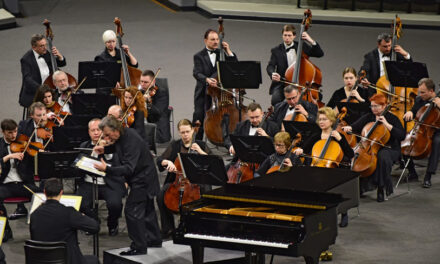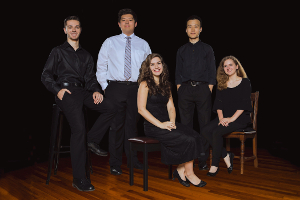If music be the food of love, be careful what you order. This might have been a warning to those who attended Friday night’s performance by Conrad Tao at Baldwin Auditorium, part of the Duke Performances Piano Series.
Tao, a virtuosic pianist who already has achieved critical praise from The New York Times and financial blessing in the form of an Avery Fisher Early Career Grant, provided audiences with filling entrees, some of which may have left many feeling stuffed and woozy.
I am speaking, specifically, of atonal pieces by Frederic Rzewski (b.1938), David Lang (b.1957), and grand master composer Aaron Copland (1900-90). One tonal piece by Robert Schumann concluded the two-hour evening.
It was an exhausting program of intensive works, though I am still conflicted whether I admire Tao for the adventurous program or would prefer to beat him over the head for choosing so many difficult pieces. For certain, he is a modern music champion (as am I), but the difficult listening challenges presented by some of the works probably burdened Durham’s audience.
The first half of the concert featured two Rzewski pieces from North American Ballads, variations on blues songs of the American labor union movement. Rzewski morphed the first, “Which Side are You On?” (an a cappella version of the song was played by Tao on an iPod and speaker), into cluster chords and horrific washes of dissonance. This was an achievement for the player, for he needed both athletic strength and concentration to play Rzewski’s repeated motifs over and over and over, ultimately to convince the listener this jumbled piece is worth hearing. Tao did just that.
After the first selection, Tao continued with Copland’s Piano Sonata, a more daring departure from the composer’s well known tonal pieces like Appalachian Spring and Rodeo. Here, Copland explores conflicting natures in exclamations of anger and frustration through the lower octaves of the piano. Intermittent with these are higher-register tinklings: thoughts made into clear ideas that eventually meet with the lower octave exclamations in the piano’s middle range to display phrases that resemble melodies. Perhaps this was a result of the first two movements of the sonata having been stolen; Copland reconstructed them from memory.
The first half of the program ended with Rzewski’s “Winnsboro Cotton Mill Blues,” a piece that began with the pianist using both elbows to bang on the lower octaves of the piano for roughly three minutes. As the piece progressed, the song began to emerge as a coherent melody, interspersed with elbow-banging interruptions. Tao’s control and emotional playing informed the piece by revealing the emotional nature that lies under the blues. In the genre, deep, longing sadness often infuses melodies that speak of pain, yet with Tao’s expressive playing, I was led to believe that sadness doesn’t just inform the blues but instead makes it truly ache – and it hurts.
Following intermission, Tao’s sekections seemed more accessible, beginning with a gorgeous David Lang piece entitled cage, written as a tribute to composer John Cage. Schumann’s Carnaval ended the evening, Tao playing with the swift, tender hand of a romantic, making Schumann’s piece seem effortless.
The encore, by Elliot Carter (1908-2012), was written when the composer was 98 years old. Traditionally, something more familiar is played so audiences may relax and enjoy. as they prepare to depart The Carter piece had me ready to go, but Tao’s masterful playing kept me seated for its duration.
Tao is a revelation of a player with honest intensity and passion for music. Programming such challenging pieces as these displays his courage and devotion to bringing modern audiences closer to new music. However, most of the program was challenging and insufficiently accessible enough for Friday’s audience. Perhaps we need to listen more to the new and open up our minds.












